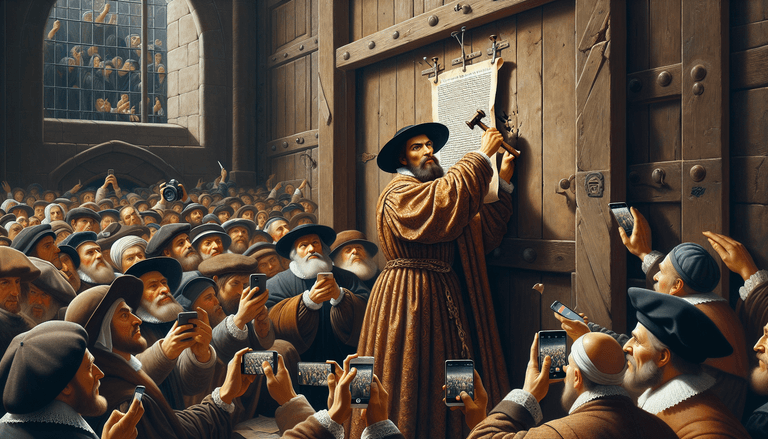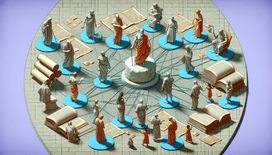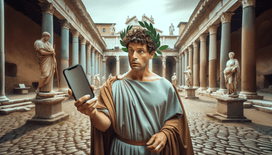Ah, the Reformation! That seismic event that split the Christian church and reshaped Europe, all thanks to a determined monk with a quill and a ninety-five theses. But what if, and bear with me here, Martin Luther had an altogether different tool in his evangelical arsenal? What if instead of nailing his grievances to a church door in 1517, he posted them on Facebook?
A 16th Century Like and Share Revolution
Imagine Martin Luther waking up, pouring himself a strong cuppa bitter beer (since coffee was yet to take hold in Europe), and logging into Facebook, or should we say "WittenBook," before settling in to craft his spiritual manifesto. Instead of scrambling to find nails and wood, often a task met with hammering challenges, he'd simply click "post."
Within seconds his 95 Theses would be shared throughout the Holy Roman Empire with memes included such as "Thesis 31: It's not indulgence, it's highway robbery!" and "Thesis 53: The Pope just got poked!" The Reformation knows no borders when it's on a newsfeed.
Papal Posts and Friar Flaming
The response from Rome? A fiery comment war of course! The Vatican's social media manager would find themselves scrambling to create a rebuttal quicker than a divinely inspired lightning strike. Imagine the notifications, "Your Holiness has replied to your comment with a strongly worded Papal Bull!"
The entire papal court would have to take a crash course in handling the Protestant troll army. "Jesus Saves" might’ve taken on a whole new meaning as followers "saved" countless screenshots of debates and discussions, leading to Germany's first viral post: "#DietOfWormsChallenge."
The Social Sermons
Luther's Facebook Live sessions would rival any modern-day influencers. But instead of unboxing or make-up tutorials, they would be compelling theological debates and sermon series. Followers list would swell, Likes of Approval would be in thousand, and everyone's timelines would be filled with Luther's righteous indignation over church practices. Hashtags like #ReformForReal, #PreachItMartin, and #NailinIt would trend faster than a knight's steed on an electoral road.
Consider the local taverns having to serve as Wittenberg's answer to internet cafes. Patrons endlessly debating Luther's latest live post while hurriedly tapping out comments like "Luv ur werk #Luther," or "U gotta ABSOLVE me of THIS deadline!" as bustling banners advertise the next big "Reformation Rave" - an event spreading enlightenment one update at a time.
The Cascading Effects of 'Friending' and 'Unfriending'
In a landscape where alliances were as slippery as a medieval eel pie, the friending and unfriending sprees would be phenomenal. Political figures wouldn't need to draft lengthy allegiance letters. No, a simple 'friend' or 'unfriend' click would suffice. "Maximilian I is now friends with Martin Luther" or "Leo X no longer finds Martin amusing" might as well be gospel.
Imagine the scramble of influential patrons vying to publicly "friend" Luther to gain favour in hot political circles, and of course, the corresponding "unfriending" betrayals with gifs of dramatic door slammings. Truly, the first Lutheran "influencer collapse" might have happened when too many petty princes vied for Luther's exclusive attention in the virtual realm.
The Ultimate Postscript
While Martin Luther's Facebook-powered Reformation might seem a jest to our 21st-century eye, consider this: Would the Reformation have had the same profound impact with such rapid-fire communication? Would other reformers have been more swayed by instantaneous 'Reform Stories' or 'Divine Updates' rather than the good old classic epistles and pamphlets that took weeks to arrive?
What we can be sure of, dear readers, is Luther tapping ever-ready keys whilst altering history, a reminder of the transformative (and occasionally tumultuous) role technology plays in our social and spiritual spheres. As they say, "He who hath a Facebook hath a megaphone!"







